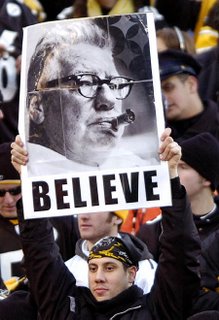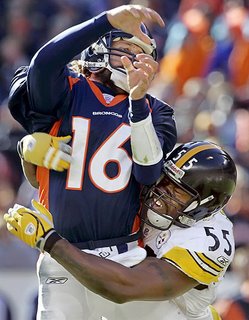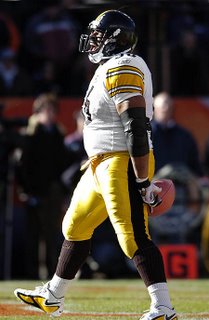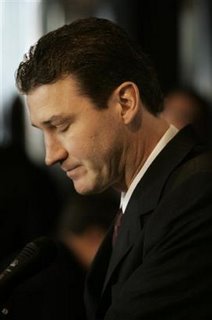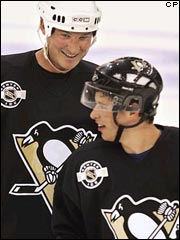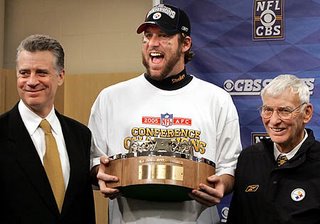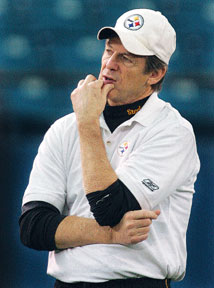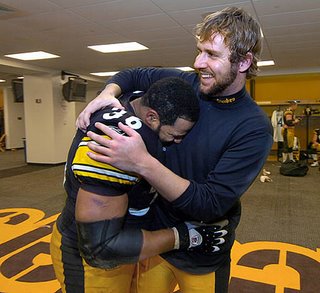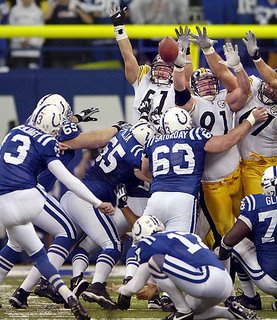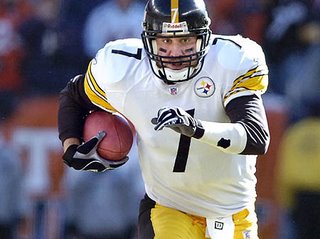 January 31, 2006
January 31, 2006BY NICHOLAS J. COTSONIKA
DETROIT FREE PRESS SPORTS WRITER
"He's ..."
Thump.
"He's come back ..."
Laugh.
"He's gotten better, and obviously it's showing this year in the postseason."
It's Friday, three days before the Steelers leave for Detroit and Super Bowl XL.
Tight end Jerame Tuman is trying to talk about how quarterback Ben Roethlisberger has matured since last season -- and Roethlisberger is across the locker room, chucking a mini soccer ball at him.
"He obviously has a sense of humor," a reporter says.
"Yeah, well, what is he?" Tuman says. "Twenty? I don't know."
"Twenty-three."
"Yeah. The kid, he's young. He's like a little 12-year-old bouncing around here."
Tuman, a 29-year-old veteran out of Michigan, talks with his head up, without making eye contact, waiting for the next missile.
"We've done this all year long," Tuman says. "It's a fun game to play, but it's not fun when you're trying to do stuff in your locker and you're not paying attention. You always got to pay attention."
"Has he ever nailed you in a bad spot?"
"Oh, yeah. We've both hit each other in the face. As accurate as he is on the field, he's awful throwing that Nerf ball. Awful. You never know where it's going."
* * *
Looking at Roethlisberger these days -- from his efficient play on the field to the bushy beard on his face -- it's easy to forget he isn't a grizzled vet.
But at 23 years, 11 months, he will be the second-youngest quarterback ever to start a Super Bowl and will be trying to become the youngest ever to win one. Dan Marino was 23 years, four months, when he led the Dolphins to Super Bowl XIX at the end of the 1984 season and lost to the 49ers.
It was only six years ago that Roethlisberger was in high school in Findlay, Ohio, a small town less than two hours from Detroit.
It was only two years ago that he was in college at Miami (Ohio), in the same league, the Mid-American Conference, with Eastern Michigan and Central Michigan and Western Michigan.
Big Ben?
Big Boy would be more like it.
If he gets a little goofy in the locker room sometimes, hey, he's just acting his age.
"We always joke around," Roethlisberger said. "It's business, but it's still fun at the same time."
The most amazing thing is how he has been growing up -- in public, under pressure -- with so few growing pains. He is an astounding 26-4 as an NFL starter, regular season and playoffs combined.
The Steelers turned to Roethlisberger in the second game of last season after Tommy Maddox went down with an elbow injury, and not everyone was excited to see what the 11th pick of the 2004 draft could do. The rookie was all of 22.
"Excited?" left guard Alan Faneca said then, according to the Pittsburgh-Post Gazette. "No, it's not exciting. Do you want to go to work with some young kid who's just out of college?"
Veteran running back Jerome Bettis, who had taken Roethlisberger under his wing from the beginning, brought him in even closer.
"That's a tough thing when you've got a team that's looking at you as a leader and you're a rookie," Bettis said. "You've got to develop that. First of all, you have to understand that's expected of you. How do you understand that if you don't know?"
Roethlisberger won his first start. Then his second. And his third. And so on.
By his ninth, Bettis noticed a breakthrough. Roethlisberger had been robotic, reading the play off his wristband without making eye contact with his teammates. Now he was relaxed.
"He was comfortable enough to read the play, get it to everybody, look at everybody and give them that sense of comfort," Bettis said. "It was like, 'OK, he's got it.' "
By the end of the regular season, Roethlisberger was 13-0 and the Steelers were 15-1.
He couldn't help but be overconfident because he had tasted only success, no failure. He couldn't help but be tired because he had never been through the rigors of an NFL season, only the shorter college schedule.
Looking back last week, Roethlisberger pointed to how rookie tight end Heath Miller handled an interview session.
"He looked like he was about ready to fall asleep," Roethlisberger said. "That's how I was last year."
It caught up to him. In two playoff games, he completed 57.4% of his passes, threw three touchdowns against five interceptions and posted a 61.3 rating.
After the Steelers lost the AFC championship to the Patriots, he grabbed Bettis and begged him to come back for another year so he could get him to the Super Bowl in his hometown of Detroit.
"My performance wasn't up to par," Roethlisberger said. "It definitely motivates you to play better and not let your guys down, especially guys like Jerome Bettis, who are in this game to win it."
Roethlisberger came back this season, battled knee and thumb injuries and still went 9-3 in the regular season.
"The second year makes a dramatic difference to any player," coach Bill Cowher said. "He's more comfortable with the offense, and it makes him a better quarterback."
In three playoff games, Roethlisberger has completed 68.1% of his passes, thrown seven touchdowns against one interception and posted a 124.8 rating. He has rushed for a touchdown.
What's more, he made a season-saving tackle Jan. 15, tripping up Indianapolis cornerback Nick Harper and preventing a possible game-winning touchdown after Bettis' late-game, goal-line fumble.
After the Steelers won the AFC championship at Denver, Roethlisberger grabbed Bettis and celebrated.
"I'm glad I didn't have to cry and apologize to him that I didn't get him there," Roethlisberger said after the game. "I feel a lot better I can keep my promise to Jerome, getting him back to Detroit."
Bettis said Roethlisberger had traveled "light years" from last year to this year.
"You see the confidence, the way he's able to manage," he said. "There's not even a question mark who's the leader of the offense."
Bettis, the face of the franchise for a decade, was asked if he was handing off that distinction to Roethlisberger. He laughed.
"I didn't have to hand it off," Bettis said. "He grabbed it. And that's great, because I've never been a fan of when people say, 'Success is when preparation meets the opportunity.' No, you've got to seize the opportunity. I think that's what he's done, and he deserves everything that's coming his way."
* * *
The Super Bowl that Marino made at 23 turned out to be the only Super Bowl he ever made. He never got another chance to win the big one.
Even when he went into the Hall of Fame, some people -- despite all the gaudy statistics he put up, all the records he set -- defined him more by what he hadn't done than by what he had.
Marino called Roethlisberger last week.
"He said, 'Listen. Enjoy this. You're young. You're doing the same thing I did. You think no matter what happens, you're going to get back. It doesn't necessarily happen like that,' " Roethlisberger said. "He said, 'On one hand, enjoy it and have a good time. But take it serious enough that you want to win it because you never know when it's going to happen again.' "
Roethlisberger listened. He said he would limit his media time this week, and he was conspicuously absent at the Steelers' arrival news conference Monday.
That said, if you're walking through the Steelers' locker room this week, watch out.
"We're going to stay loose," Roethlisberger said. "We're going to have our fun."
Contact NICHOLAS J. COTSONIKA at 313-222-8831 or ncotsonika@freepress.com.
 Packers quarterback Brett Favre watches from the turf as Steelers safety Troy Polamalu heads for the end zone after scooping up a ball fumbled by Favre in the second quarter (11/6/05).
Packers quarterback Brett Favre watches from the turf as Steelers safety Troy Polamalu heads for the end zone after scooping up a ball fumbled by Favre in the second quarter (11/6/05).